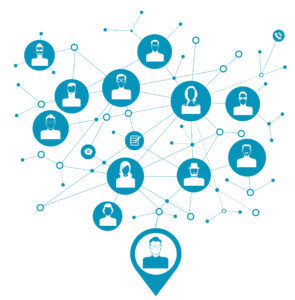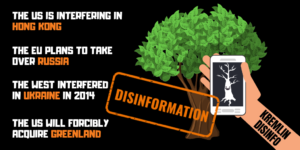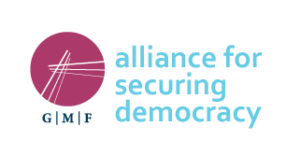A Disinformation ABC: Actors, Behavior, Content
In addressing disinformation online, policy makers should focus on bad actors and deceptive behavior, and avoid basing decisions on content, because much of what is characterized as “fake news” or “viral deception” may be protected speech in a democratic society.
So argues the Transatlantic High Level Working Group on Content Moderation Online and Freedom of Expression.
“Governments should refrain from triggering the removal of undesirable, but legal, content, as such action is inconsistent with freedom of expression,” said Susan Ness, the group’s co-chair and founder, releasing a report and a set of working papers on efforts to curb disinformation, including A Disinformation ABC.
Actors, Behavior, Content
 In the Disinformation ABC, “A” is for manipulative actors, “B” is for deceptive behavior, and “C” is for harmful content, notes Camille François of Graphika and Harvard University’s Berkman Klein Center. This ABC framework lays out three key vectors characteristic of viral deception in order to guide regulatory and industry responses while minimizing the impact on freedom of expression. While the public debate in the U.S. is largely concerned with actors – who is a Russian troll online? – the technology industry has invested in identifying and addressing malevolent, coordinated behavior, while governments have focused on content. Download
In the Disinformation ABC, “A” is for manipulative actors, “B” is for deceptive behavior, and “C” is for harmful content, notes Camille François of Graphika and Harvard University’s Berkman Klein Center. This ABC framework lays out three key vectors characteristic of viral deception in order to guide regulatory and industry responses while minimizing the impact on freedom of expression. While the public debate in the U.S. is largely concerned with actors – who is a Russian troll online? – the technology industry has invested in identifying and addressing malevolent, coordinated behavior, while governments have focused on content. Download
EU DisinfoLab has uncovered an international network of 265 fake media outlets in 65 countries, targeting the US, Canada, Brussels, Geneva and many more, Alexandre Alaphilippe writes. These media outlets are coordinated to serve Indian geopolitical interests, especially targeting Pakistan’s actions in Kashmir. Read the thread here. Read the summary here. Save the date for EU DisinfoLab’s annual conference: #Disinfo2020: 5-6 May 2020

EU vs Disinfo
The Transatlantic High Level Working Group on Content Moderation Online and Freedom of Expression (TWG) examined codes of online content regulation at a session co-sponsored by the Annenberg Public Policy Center of the University of Pennsylvania and the Annenberg Foundation Trust at Sunnylands. The new report (download here), highlights best practices from the discussions:
- Tech companies and governments should adopt “freedom of expression by design” as a guiding principle;
- Companies should strengthen transparency and accountability and ensure that their terms of service and community standards are clear, accessible, and consistently enforced, with mechanisms in place for users seeking redress from adverse decisions;
- Wider consideration should be given to a French government proposal for a new regulatory regime that would oversee transparency and accountability of platform content-moderation systems, rather than ruling on the content itself……
 Foreign powers covertly funnel money into Western politics; thwarting their actions will require active and coordinated responses from governments and the private sector, Alliance for Securing Democracy Fellow for Malign Finance Josh Rudolph said in a panel discussion at the Center for International Private Enterprise, a partner of the National Endowment for Democracy.
Foreign powers covertly funnel money into Western politics; thwarting their actions will require active and coordinated responses from governments and the private sector, Alliance for Securing Democracy Fellow for Malign Finance Josh Rudolph said in a panel discussion at the Center for International Private Enterprise, a partner of the National Endowment for Democracy.
The Russian Federation has been using various tools and strategies to destabilize democratic or democratizing governments across Europe and Eurasia and encourage the rise of populist, anti-democratic regimes, according to a new report from the International Foundation for Electoral Systems.

IFES
Democratic actors seeking to advance liberal, participatory and citizen-accountable approaches in eastern Europe and the former Soviet republics should pursue a multilateral, multipronged strategy, say IFES analysts Anthony Bowyer and Beata Martin-Rozumiłowicz.
The strategy should be part of an international toolkit to ward off malign influences that threaten the independence of these countries and, in turn, increases their reliance on a restrictive model of government that threatens human rights and stifles personal freedoms, they write in Countering Russian Influence in Europe and Eurasia, adding several recommendations including, but not limited to:
• Promoting independent citizen fact-checking and investigative journalistic initiatives
• Training countries and their citizens to defend themselves against malfeasance by promoting
media literacy and developing proper cyber hygiene
• Encouraging governments to work with media regularly and develop protective measures to
address and forestall threats, especially via social media
• Supporting international cooperation, particularly the sharing of lessons learned and good
practices in safeguarding against disinformation efforts and cyberattacks…. RTWT
Partisanship in democratic discourse creates openings for actors seeking to weaken institutions and use online space to advance their own agenda, Alliance for Securing Democracy Director Laura Rosenberger told The New York Times.









